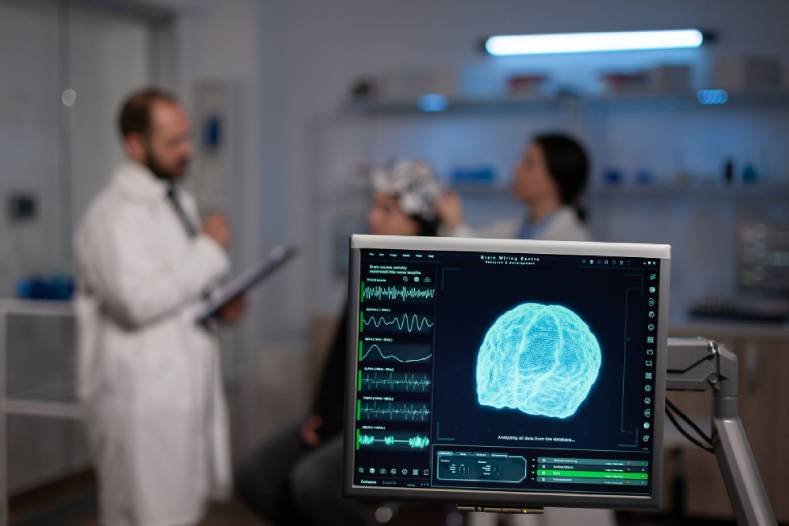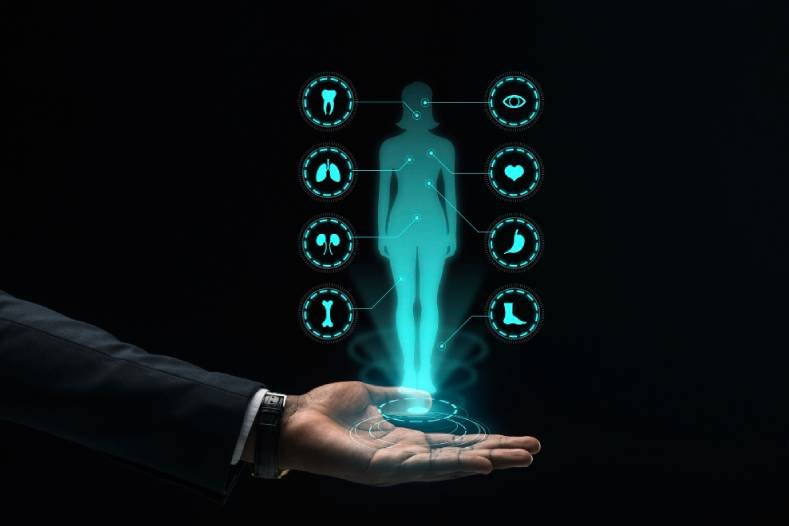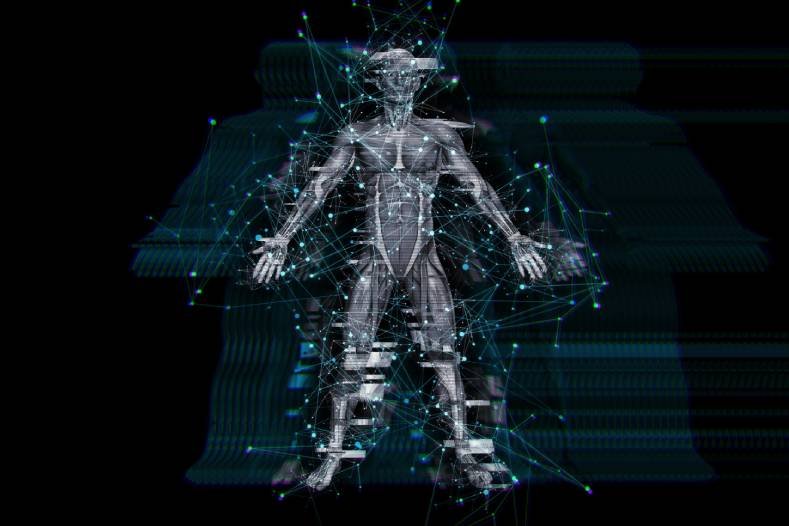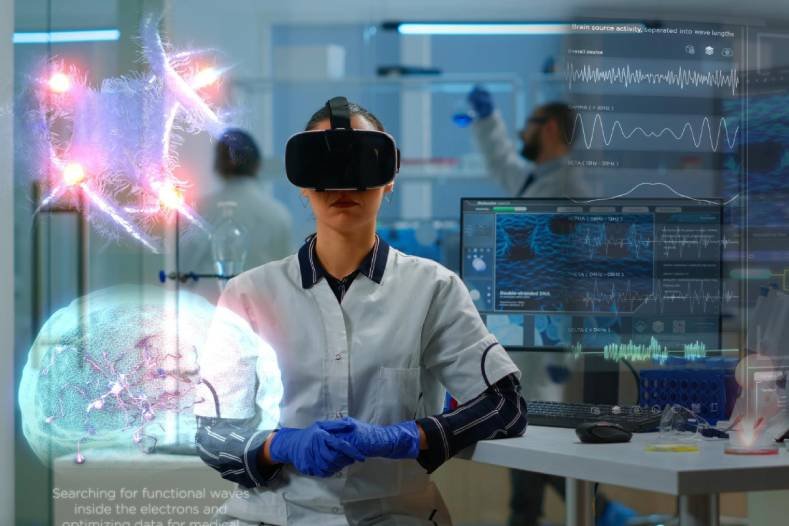
Inicio » Artificial Intelligence » Artificial Intelligence in Medicine: Current Advances and Applications
Artificial Intelligence in Medicine: Current Advances and Applications
Share note:
Artificial intelligence (AI) has revolutionized many aspects of modern life, including medicine. AI is a branch of computer science that focuses on the development of systems that can perform tasks that require human intelligence, such as learning, reasoning and decision making. In medicine, AI is used to improve diagnostic accuracy, treatment efficiency and patient care.
AI in medicine has become a valuable tool for healthcare professionals. AI systems can analyze large amounts of medical data, including images, patient records and test results, to identify patterns and trends that can be difficult for humans to detect. In addition, AI can help clinicians make more informed and accurate decisions about treatment and patient care.
As AI technology continues to evolve, its use in medicine is expected to continue to grow. However, it is also important to consider the potential risks and ethical challenges associated with the use of AI in healthcare. Despite these challenges, AI in medicine has the potential to significantly improve the quality of medical care and save lives.

Artificial Intelligence in Medicine
Artificial Intelligence (AI) is a technology that has revolutionized many aspects of everyday life, and medicine is no exception. AI refers to the ability of machines to learn and make data-driven decisions without direct human intervention. In medicine, AI has been used to improve diagnostic accuracy, speed up treatment and improve overall patient care.
AI has been used in medicine in a variety of ways, such as in the interpretation of medical images, such as computed tomography (CT) scans, magnetic resonance imaging (MRI) and X-rays. AI has also been used to analyze large amounts of medical data, such as electronic medical records and laboratory test results, to identify patterns and trends that human doctors may have missed.
AI has also been used to develop disease prediction models, which can help doctors detect diseases at an early stage and provide more effective treatment. For example, AI has been used to predict the risk of heart disease and diabetes in patients, enabling physicians to take preventive measures to reduce the risk of disease.
In addition, AI has been used to improve the efficiency and accuracy of surgical procedures. AI-controlled surgical robots can perform complex procedures with greater precision and speed than human surgeons. This has led to a reduction in recovery time and postoperative complication rate.
In summary, AI has proven to be a valuable tool in medicine, and its use will continue to increase in the future. While AI will not replace human physicians, it can help improve diagnostic accuracy, speed up treatment and improve overall patient care.

Disease Diagnosis and Detection
Artificial intelligence (AI) has revolutionized the field of medicine, especially in the diagnosis and detection of diseases. AI applied to medical imaging, such as X-rays, MRI and CT scans, has improved the accuracy and speed of diagnosis, resulting in better treatment and prognosis for patients.
Image Analysis
Mathematical algorithms used in AI are able to analyze large amounts of medical images in a short time and detect patterns and anomalies that can be difficult for the human eye to identify. For example, in the diagnosis of breast cancer, AI can detect small lesions that might have been missed on a conventional X-ray.
In addition, AI can also be used to analyze images in real time during surgery, allowing the surgeon to more accurately identify the areas to be treated and minimize collateral damage.
Disease Detection
AI is also being used to detect diseases in their earliest stages, which can significantly improve patient prognosis. AI algorithms can analyze large amounts of patient data and detect patterns that indicate the presence of a disease.
For example, AI is being used to detect cardiac diseases, such as arrhythmias, in electrocardiograms (ECGs). AI algorithms can identify abnormal ECG patterns and alert the physician to the need for further testing.
In summary, AI has significantly improved the diagnosis and detection of diseases in modern medicine. The ability of AI to analyze large amounts of data and detect patterns and anomalies has enabled physicians to identify diseases at their earliest stages and provide better treatment and prognosis for patients.

Technology and Robotics in Medicine
Technology and robotics have revolutionized the field of medicine in recent decades. Robotic assistance and autonomous vehicles are just some of the most prominent developments in this area.
Robotic Assistance
Robotic assistance refers to the use of robots to assist in medical tasks. These robots can be controlled by a physician or can be programmed to perform specific tasks autonomously. Some examples of robotic assistance in medicine include:
- Robotic surgery: Surgical robots can perform complex surgical procedures with greater precision and shorter recovery time for the patient.
- Assistance for the disabled: Robots can help people with physical disabilities perform everyday tasks such as walking, getting up and sitting down.
- Assistance for the elderly: Robots can help the elderly live more independently by providing assistance with household and personal care tasks.
Autonomous Vehicles
Autonomous vehicles refer to vehicles that can operate without the need for a human driver. In medicine, autonomous vehicles are being used to transport medical supplies and equipment to hospitals and clinics. These vehicles can also be used to transport patients via autonomous ambulances.
In short, technology and robotics are transforming medicine in ways that were previously unthinkable. Robotic assistance and autonomous vehicles are just some of the most prominent advances in this field, and are expected to continue to evolve and improve medical care in the future.
Treatment and Therapeutics
Artificial intelligence (AI) is revolutionizing the treatment and therapeutics of many diseases. AI is able to analyze large amounts of medical data and find patterns that human doctors might miss. This means that AI can help physicians make more accurate and personalized decisions for each patient.
AI is also being used to develop digital therapies that can help patients manage and treat their diseases. These digital therapies may include mobile applications, computer programs and Internet-connected medical devices. For example, Roche’s Digital Therapeutics Alliance is developing digital therapies for diseases such as diabetes, multiple sclerosis and chronic obstructive pulmonary disease (COPD).
AI is also being used to improve the accuracy of diagnostics and to identify more effective treatments for diseases such as cancer. AI algorithms can analyze medical images, such as X-rays and scans, to detect patterns that human doctors might miss. This means that patients can receive more accurate diagnoses and more effective treatments.

Big Data and Neural Networks
Big Data in Medicine
Big Data is one of the technologies that is changing the way clinical data is handled in modern medicine. The use of Big Data enables physicians and other healthcare professionals to use patterns and trends to predict and prevent disease, as well as to personalize treatments for individual patients.
The clinical data generated by patients is enormous and complex, and Big Data enables healthcare professionals to analyze that data to identify patterns and trends that can be used to improve patient care. The use of Big Data in medicine can also improve efficiency and reduce costs in the healthcare system.
Neural Networks in Medicine
The Neural Networks are a type of machine learning algorithm that is inspired by the structure and function of the human brain. Neural Networks are a type of Artificial Neural Networks (ANN) that are capable of learning from data.
In medicine, Neural Networks are used to analyze large amounts of clinical data and to identify patterns and trends that can be used to improve patient care. Neural Networks can also be used to predict and prevent disease, as well as to personalize treatments for individual patients.
Deep Learning is a form of Neural Networks that uses multiple layers of processing to analyze large amounts of data. Deep Learning is especially useful for analyzing medical images and identifying patterns and trends that can be used to improve patient care.
In short, the use of Big Data and Neural Networks in medicine is changing the way clinical data is handled and how patient care is delivered. Healthcare professionals can use these technologies to predict and prevent disease, personalize treatments for individual patients and improve the efficiency of the healthcare system.

Ethics and Responsibility
Artificial intelligence (AI) in medicine can be a powerful tool for improving medical care and patient well-being. However, it also raises important ethical and liability questions that must be addressed. In this section, some of the major ethical and liability issues related to AI in medicine will be discussed.
Privacy and Confidentiality
One of the biggest ethical and liability challenges related to AI in medicine is the privacy and confidentiality of patients’ medical data. AI requires large amounts of medical data to function properly, and it is important to ensure that this data is handled safely and ethically.
Physicians and AI developers must take steps to ensure that patients’ medical data is handled securely and confidentially. This may include implementing data security measures such as data encryption and user authentication. In addition, patients should have the right to control access to their medical data and to know how their data are being used.
Transparency and Equity
Another ethical and liability issue related to AI in medicine is transparency and fairness. It is important for patients to understand how AI algorithms are being used to make medical decisions and to be informed if AI algorithms are being used to make important medical decisions.
In addition, it is important to ensure that AI algorithms are fair and equitable. AI algorithms can be biased if they are trained on data that do not adequately represent the entire population. Therefore, it is important to ensure that the data used to train AI algorithms are representative of the entire population.
In summary, AI in medicine offers great promise for improving medical care and patient well-being. However, it also raises important ethical and liability questions that must be addressed. Privacy and confidentiality of patients’ medical data, as well as transparency and fairness in the use of AI algorithms, are critical issues that must be addressed to ensure that AI is used safely and ethically in medicine.

Implications for Health Professionals
Artificial intelligence (AI) is changing the way healthcare professionals work and interact with patients. Physicians and other healthcare workers can use AI to improve diagnostic accuracy, treatment efficiency and patient care management. However, the implementation of AI also poses certain challenges and concerns.
Improved Diagnosis and Treatment
AI can help healthcare professionals identify patterns and relationships in large medical datasets. This can improve the accuracy of diagnosis and treatment, especially in complex or rare cases. Machine learning algorithms can also help physicians predict disease progression and identify personalized treatments for individual patients.
Patient Care Management
AI can also help healthcare professionals manage patient care more efficiently. Chatbots and other virtual assistance systems can help patients schedule appointments, receive medication reminders and get basic information about their health. Clinicians can also use AI to analyze large patient data sets and improve patient care management.
Challenges and Concerns
However, the implementation of AI also poses certain challenges and concerns for healthcare professionals. For example, some physicians may worry that AI will replace human healthcare workers. Others may worry that AI could perpetuate biases and inequities in medical care. In addition, AI implementation may require significant investment in technology and training.
In short, AI has the potential to significantly improve medical care and patient care management. However, healthcare professionals must be aware of the challenges and concerns associated with AI implementation and work to address them effectively.

Investment in Artificial Intelligence in Medicine
Investment in artificial intelligence in medicine has become one of the most important trends in the healthcare sector. Artificial intelligence (AI) offers great potential to improve the quality of medical care, reduce costs and accelerate the development of new treatments and drugs.
In recent years, pharmaceutical and technology companies have invested heavily in the research and development of AI solutions for medicine. According to a report by Accenture, investment in AI in the healthcare sector is expected to reach $6.6 billion by 2021.
AI can be used in a wide variety of applications in medicine, from diagnostics to the development of new drugs and treatments. For example, AI can be used to analyze large amounts of medical data and create predictive models to identify diseases and disorders at an early stage.
In addition, AI can also be used to improve the efficiency of clinical trials and accelerate the development of new drugs and treatments. AI can help identify patients who might benefit most from a specific treatment and reduce the number of patients who need to be included in clinical trials.
In summary, investment in artificial intelligence in medicine is a major trend that is transforming the way medical care is delivered. AI offers great potential to improve the quality of medical care, reduce costs and accelerate the development of new treatments and drugs.

The Future of Artificial Intelligence in Medicine
Artificial intelligence (AI) has proven to be a valuable tool in medicine, and its use will continue to grow in the future. With the COVID-19 pandemic, AI has proven to be especially useful in the fight against the disease.
In the future, AI is expected to play an even more important role in medicine. As technology continues to advance, AI will become more accurate and will be able to help physicians make more informed decisions.
AI will also have a significant impact on medical research. With the ability to analyze large amounts of data, AI can help researchers identify patterns and trends that might otherwise go unnoticed.
In addition, AI can help improve efficiency in medical care. For example, AI can help physicians schedule appointments and manage workload, which can reduce waiting time for patients and improve care.
While AI has the potential to transform medicine, it is also important to consider the ethical and privacy challenges that arise with its use. It is important that healthcare professionals and technology developers work together to ensure that AI is used responsibly and ethically.
In summary, the future of AI in medicine is promising. With proper and responsible use, AI can help improve medical care and research, which can have a significant impact on people’s health and well-being.
What are the most relevant applications of artificial intelligence in medicine?
Artificial intelligence has many applications in medicine, including disease diagnosis and treatment, personalization of medical care, and medical research. Some of the most relevant applications include early detection of disease, identification of patterns in large medical datasets and prediction of treatment outcomes.
How can artificial intelligence improve medical care in hospitals?
Artificial intelligence can improve medical care in hospitals in several ways. For example, it can help physicians make more informed decisions by providing accurate and up-to-date information about the patient’s condition. It can also help hospitals better manage their resources, such as beds and staff, by predicting demand and planning accordingly.
What are the prospects and problems of applying artificial intelligence in medicine?
The application of artificial intelligence in medicine has many positive prospects, such as improving diagnostic and treatment accuracy, reducing costs and increasing efficiency. However, there are also concerns about the privacy of medical data, possible discrimination and lack of transparency in the algorithms used.
What diseases can be detected by artificial intelligence?
Artificial intelligence can detect a wide variety of diseases, from heart disease to cancer and infectious diseases. Examples of diseases that can be detected with the help of artificial intelligence include diabetic retinopathy, Alzheimer’s disease and pneumonia.
How is GPT chat technology used in medicine?
GPT chat technology can be used in medicine to help patients obtain information about their health and to provide personalized medical care. For example, a GPT chatbot can answer common questions about a disease or clarify the side effects of a medication.
What are the advantages and disadvantages of artificial intelligence in medicine?
The advantages of artificial intelligence in medicine include improved diagnostic and treatment accuracy, reduced costs and increased efficiency. However, there are also concerns about the privacy of medical data, possible discrimination and lack of transparency in the algorithms used. In addition, some patients may feel that medical care is less personalized and less humane.
Would you like to apply Artificial Intelligence in your projects? At Virtual Arena we are specialists in consulting and development of artificial intelligence for companies and institutions.
Recent articles
Do you have a project in mind?
Related articles








